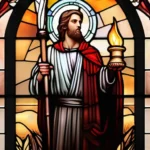Explore the significance, criteria, and rewards of martyrdom in Islamic faith.
Delve into the profound concept of martyrdom in Islam, its importance, and the criteria that define a martyr. Discover the unique place it holds in the Islamic faith and the rewards bestowed upon those who attain this status.
The Significance of Martyrdom in Islam
Understanding martyrdom in Islam goes beyond the mere act of dying for one’s faith; it encompasses a profound journey that transforms individuals and societies. Can we truly grasp the significance of martyrdom without delving into its deep-rooted importance within Islamic teachings? Martyrdom, or shahada, is not just about sacrifice—it’s about embodying the essence of Islam’s core values.
Martyrdom in Islam serves as a powerful beacon, guiding believers to uphold justice and righteousness. It highlights the struggle between good and evil, drawing individuals towards acts of courage and selflessness. But is martyrdom simply about physical sacrifice? Or does it involve a deeper spiritual commitment that transcends mere death?
Consider the metaphor of a flame—a single candle can light up a room, yet an entire forest ablaze can transform a landscape. Similarly, while a solitary act of martyrdom might inspire one person, a collective dedication to shahada can ignite a profound impact on a community’s moral fabric. Martyrdom in Islam is thus not merely about personal sacrifice; it’s about setting an example that others may follow.
The role of martyrdom in shaping the Islamic faith cannot be understated. It serves as both a historical and contemporary narrative, with stories of brave martyrs inspiring future generations to stand firm against adversity. How many times have you heard tales of those who died for their beliefs, only to see their sacrifices transformed into symbols of resilience and strength? These stories are not just history; they’re living lessons that remind us of our obligations as Muslims.
Martyrdom in Islam also holds the promise of significant rewards. For the individual who dies for their faith, martyrdom is a path to spiritual elevation and the presence of God. But what about those who witness such acts? Can they too benefit from this journey? Indeed, witnessing or inspiring others to achieve shahada can bring its own form of spiritual reward, illustrating that the impact of martyrdom extends far beyond the individual.
In essence, understanding the significance of martyrdom in Islam is about recognizing its multifaceted role. It’s not just a tragic end but a transformative beginning—a call to action for all who seek to live out their faith with courage and integrity. As we explore the criteria that define a true martyr in Islam, remember: every act of sacrifice has the potential to light a new flame.
Criteria for a Martyr in Islam
When we talk about martyrdom in Islam, one can’t help but ponder over the stringent criteria that define who truly qualifies as a martyr. A martyr, in Islamic terms, is someone who dies for the sake of their faith or a just cause. But how does one become a martyr? What are the specific conditions and tests they must pass?
Firstly, intention plays a pivotal role. The martyr’s intention should be pure and sincere; it must align with the commandments of Allah. Is their desire to die for their beliefs or defend justice so strong that they willingly choose death over abandoning their faith? This intention is akin to a seed sown deep within, ready to sprout at any moment.
Secondly, the cause must be just and righteous. A martyr’s sacrifice should not be for personal gain or iniquity but rather for the greater good of humanity. Think about it: are we willing to risk everything for a principle that matters more than our lives? This test of self-sacrifice is both daunting and humbling.
Lastly, the method of death must be by an act of aggression or violence, not through natural causes. The martyr’s life ends abruptly in the service of their faith, often under unjust circumstances. It’s as if a sudden gust of wind extinguishes a flame that has burned brightly for its cause.
In sum, becoming a martyr is not just about enduring pain; it’s about making the ultimate sacrifice with a clear conscience and an unwavering commitment to righteousness. As we reflect on these criteria, we are reminded of the profound impact one can have through selfless acts of devotion.
Rewards for Martyrs in Islam
In Islam, the concept of martyrdom carries profound significance, often described as a noble act that brings immense reward both in this life and the hereafter. But what exactly are these rewards? How do they manifest for those who make the ultimate sacrifice?
Firstly, let us consider the rewards in this world. Martyrs are seen as role models of selflessness and bravery. Their names often become celebrated, and their stories inspire others to live a life dedicated to imamah, or guidance. The community rallies around them, offering support and encouragement to their families—a stark contrast to the isolation they may have faced in their lifetime.
Moving on to the hereafter, the rewards are even more spectacular. In Islam, martyrdom is considered a form of sacrifice that brings individuals closer to God. It is believed that martyrs enter Paradise immediately after death, enjoying the company of the prophets and saints without any suffering or trials.
The Quran emphasizes these rewards with powerful metaphors. Martyrs are likened to those who have been granted good news by their Lord—news of gardens beneath which rivers flow, where they will be forever free from hunger and thirst (Quran 3:157). This imagery paints a vivid picture of eternal bliss and comfort.
Furthermore, the rewards extend beyond personal gain. Martyrs are seen as protectors of the faith, their sacrifice ensuring that Islam continues to thrive despite opposition. Their deaths are seen not just as tragic but as pivotal moments in history, marking turning points where the tide of events shifts.
In conclusion, martyrdom in Islam offers profound rewards both materially and spiritually. It is a path chosen by those who seek the favor of God, willing to endure the ultimate sacrifice for their beliefs. As we explore this concept further, it becomes clear that these rewards are not just for the individual but also serve as a beacon for the community and the faith itself.
Note: The descriptions provided here are based on traditional Islamic teachings and interpretations. It is always recommended to consult with knowledgeable scholars or religious leaders for more detailed guidance.
The Spiritual Journey of a Martyr
The spiritual journey of a martyr is as profound as it is perilous, much like navigating through a dense forest where every step could lead to a fork in the path. What drives one to embark on such a treacherous yet noble quest? Is it not the pursuit of a higher purpose, a calling that transcends the mundane concerns of daily life?
Preparation for martyrdom begins long before the moment arrives. It involves a deep spiritual transformation where one must cleanse their heart and mind from impurities. Just as a sculptor prepares to shape marble into art, so too must the soul be refined in preparation for its ultimate form. This journey is not just about physical readiness but also about emotional and psychological fortitude.
The call to martyrdom can come suddenly, like an unexpected storm. But those who have prepared themselves face it with a sense of calm certainty, as if they were walking towards the light at the end of a long tunnel. This moment is both terrifying and exhilarating, a crossroads where one must choose between life’s fleeting comforts or the eternal reward promised by their faith.
The attainment of martyrdom is not merely about dying; it’s about living an entire life in service to a higher cause. Just as a ship reaches its destination after braving turbulent waters, so too does the martyr arrive at a place where their sacrifice becomes a beacon for others. Their journey, though marked by pain and suffering, ultimately leads to spiritual elevation and closeness to God.
The story of every martyr is unique yet interconnected, like threads woven into a tapestry that depicts the broader narrative of faith and sacrifice. Each thread carries its own weight and significance, contributing to the rich fabric of Islamic history.
Martyrdom in Islamic History and Literature
Martyrdom in Islamic history and literature has been both a source of inspiration and a profound influence on the faith and society. Think about the brave souls who sacrificed their lives for the sake of Islam. How do these stories resonate with you, and what lessons can we draw from them?
Consider the story of Abd Allah ibn al-Harith, a companion of the Prophet Muhammad. He was captured during a battle and given the choice to convert or face execution. Instead of converting, he chose martyrdom, saying, ‘I shall not turn my back on the call of God even if I am left alone.’ His unwavering commitment to his faith serves as a powerful example of martyrdom.
Another notable figure is Abu Dhuayb ibn Safwan al-Bahili. During the early days of Islam, he was killed in a skirmish with the Meccans. His last words were, ‘By God, I am dying as a Muslim!’ These simple yet profound words encapsulate the essence of sacrifice and devotion to one’s faith.
Martyrdom has also left its mark on literature, with poets like Imam al-Shafi’i, who wrote about the virtues of sacrifice in his works. His poetry not only inspired individuals but also helped shape the narrative around martyrdom within Islamic culture.
Reflecting on these historical figures and literary works, we can see that martyrdom is more than just a physical act—it is a spiritual journey where one’s soul finds ultimate fulfillment. How do you think such stories impact your understanding of martyrdom in Islam? Do they inspire you to live your faith with greater purpose and dedication?
The Legacy of Martyrs in Islam
The legacy of martyrs in Islam is like a river that flows through generations, inspiring and guiding them through turbulent times. How many times have we pondered over the question: What makes someone become a martyr? Is it the thrill of adventure or the call of duty? For Muslims, being a martyr (shahid) is not just about the final act but also about the path leading to it. These individuals are seen as role models for future generations, embodying the principles of sacrifice and selflessness.
Martyrs in Islam leave behind more than just stories; they create a lasting impact that echoes through centuries. Their lives serve as a beacon of light, guiding others towards faith and righteousness. Think about it: how many times have you felt inspired by the tales of those who chose martyrdom over submission to oppression? These heroes of faith teach us not just with words but with their actions, showing that true strength lies in the ability to stand up for what one believes in, even when facing certain death.
The lessons imparted by martyrs are profound and multi-faceted. They teach about the importance of ijtihad, or independent reasoning, urging believers to always seek truth and justice. Through their sacrifice, they remind us that every life is precious and can make a difference in the world. Martyrs also highlight the essence of sacrifice for a greater cause; they show that true happiness comes not from personal gain but from selflessness and dedication to a higher purpose.
Moreover, martyrs in Islam are often seen as bridges between this world and the hereafter. Their stories serve as a reminder of the eternal rewards offered by Allah for those who sacrifice their lives in His way. The idea that one’s memory can live on forever, inspiring others even after death, is a powerful concept that keeps many Muslims motivated to uphold the values of martyrdom.
Conclusion
 Gain a deeper understanding of martyrdom in Islam, its impact on individuals and society, and the spiritual journey it represents.
Gain a deeper understanding of martyrdom in Islam, its impact on individuals and society, and the spiritual journey it represents.











